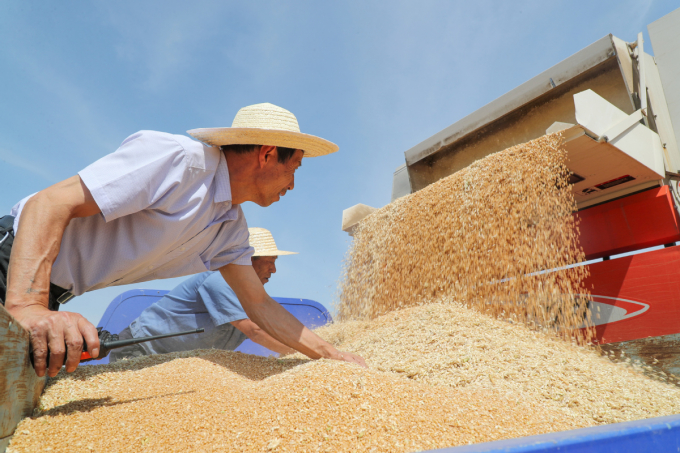June 19, 2025 | 01:24 GMT +7
June 19, 2025 | 01:24 GMT +7
Hotline: 0913.378.918
June 19, 2025 | 01:24 GMT +7
Hotline: 0913.378.918

Farmers involved in a wheat planting demonstration area in Pinglu county, Shanxi province, begin harvesting the summer wheat on 80 hectares of farmland. Photo: Chinadaily
Subsidies will be provided to crop-growing farmers who buy full-cost insurance or income insurance. The former covers various costs of agricultural production, including that of seeds, land and labor, and losses from natural disasters. And the later covers losses due to price and output fluctuations, according to the ministry.
The application scope of two types of agricultural insurance relating to planting rice, wheat and corn will be expanded to cover 500 counties with high crop yields in 13 major grain-producing provinces this year, including Sichuan, Liaoning and Jiangxi, the ministry said in a released statement earlier.
For the expanded insurance pilot, the central and local governments will increase fiscal subsidies toward premiums. Provincial governments will pay no lower than 25 percent. And 45 percent of premiums will be from the central government's budget for China's central, western and northeastern regions.
Vice-Minister of Finance Zou Jiayi said at a media conference on Tuesday that China's agricultural insurance premium subsidy policy is in line with international rules.
Most of the country's agricultural insurance premiums, which are measures to support the development of the agricultural industry, can be seen as the so-called "green box" policies under the framework of the World Trade Organization, Zou said.
Full-cost insurance, for example, is a type of natural disaster insurance, which can claim green box status. Income insurance, although it should belong to the "yellow box" measures according to WTO standards, only accounts for less than 0.2 percent of all agricultural subsidies. So both agricultural insurance premiums are fully in compliance with international rules, she explained.
For crops whose prices are basically determined by the market, such as corn, farmers can choose full-cost insurance or planting income insurance. For rice and wheat, whose prices are not fully liberalized, farmers are advised to choose full-cost insurance, the vice-minister said.
(Chinadaily)

(VAN) To address plastic pollution, closing the plastic recycling cycle will bring significant economic and environmental benefits.

(VAN) According to the Binh Thuan Department of Industry and Trade, in the first five months of 2025, Binh Thuan's dragon fruit export turnover increased by 20.65% compared to the same period last year.

(VAN) EU countries on Thursday gave final approval to new tariffs on fertilizer imports from Russia, a move aimed at cutting off revenue that could support Moscow’s war in Ukraine, despite concerns from European farmers.

(VAN) The working delegation from the Ministry of Agriculture and Environment conducted an important trip to the Netherlands to strengthen strategic partnerships and sustainable development in the agricultural sector.

(VAN) The letter ‘A Plea from the Ocean’ not only evokes emotion but also awakens the human conscience to the responsibility of protecting life on Earth.

(VAN) The Department of Agriculture in South Africa has announced the country’s first mass vaccination of poultry to prevent local birds from contracting avian influenza.

(VAN) Establishment of the Mekong Delta Regional Agricultural Linkage Center, aiming for a closed value chain, deep processing, trading platforms, and international market connectivity.